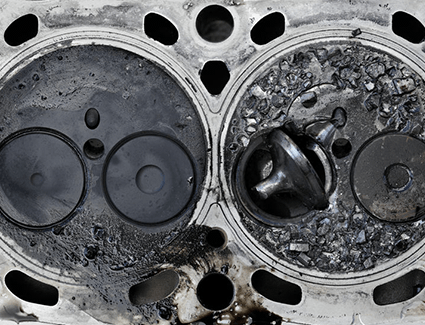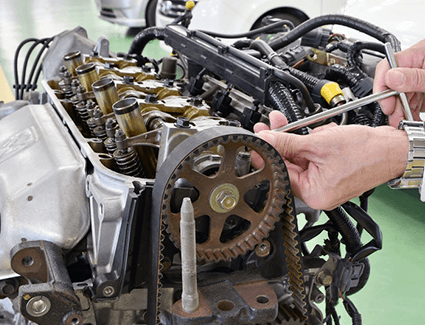Learn About Engine Timing Belts and Chains

Learn About VW Timing Belts & Chains At Archer Volkswagen
The engine in your car features a number of rapidly moving parts. All these components need to move in perfect sync in order for the engine to run its best. In fact, in a modern engine, these parts can even collide with one another if they come out of sync, causing severe damage that could cost you thousands to repair or even total your car altogether. Fortunately, your engine has a timing system! Whether it's equipped with a timing belt or chain, the timing system is crucial to the safe operation of your engine. Learn more about the timing system on your vehicle, how to maintain it and why it's important to take proper care of it below.


4. What Is The Timing System?
Your vehicle's engine can be broken down into two major sections: the engine block and the cylinder head. Inside the engine block, the pistons travel up and down the cylinders. In the cylinder head, you'll find a system of intake and exhaust valves. As the pistons travel up and down, the valves open and close to allow air and fuel mixture into the cylinders and exhaust gasses out. Modern engines can rotate at speeds of up to and beyond 9,000 RPMs in some cases! That means that the pistons are moving at incredible speeds and the valves are opening and closing multiple times per second. The engine's timing system synchronizes the movements of all the engine's moving parts -- so that the valves open and close at the precice right moment in the piston's travel for optimal performance and fuel efficiency.
In modern cars, there are two types of engine timing systems: timing belts and timing chains.
3. Why Is Timing System Failure A Major Problem?
Some modern engines are designed to such tight tolerances that the valves can open into the very same space inside the cylinder that the piston will occupy -- but the engine timing system ensures the valves are shut before the piston arrives. This is called an interference engine. Using either a metal timing chain not unlike a bike chain, or a heavy-duty rubber belt similar to an accessory belt, the engine's timing system physically links the movement of the valves with the movement of the pistons.
If the engine timing system fails, the valves and pistons will come out of sync. In such an engine, the pistons could even strike open valves, causing severe internal damage! That's why, if your car has a timing belt, it's important to get it replaced on-time according to the recommendation outlined in your owner's manual.

2. Volkswagen Timing Chain Recall & Settlement
Several Volkswagen vehicles built for the 2008-2014 model years experienced atypical rates of timing system failure. Volkswagen has agreed to extend the warranty period for the timing system on select Volkswagen Beetle, CC, Eos, GTI, Jetta, Passat and Tiguan models from those model years. The timing system on certain examples of these VW models now gets extended warranty coverage for 10 years/100,000 miles. If you're not sure if your car is included in this warranty extension, give us a call and speak to one of our technicians. We'll look up your vehicle's VIN and make sure your vehicle got the timing system service it requires. If you still need timing system service, remember that all warranty repairs made on your VW must be carried out by an authorized Volkswagen service center like ours at Archer.
1. Volkswagen Timing Belt Maintenance Intervals
If your car is equipped with a timing chain, you shouldn't have to worry about maintenance or repairs. The oil-lubricated timing chain is designed to last for the entire life of the vehicle. However, if your car has a rubberized timing belt, that part requires routine inspections and regular replacement. For example, the 1.8L turbocharged engine found in the 2002 VW Golf GTI and other Volkswagen models from that era does feature a timing belt. According to the maintenance schedule in that vehicle's owner's manual, the timing belt needs to be inspected by a trained VW technician every 40,000 miles. This ensures that any signs of premature wear on the belt are caught early. Once the belt has been in service for 105,000 miles, the belt should be replaced. Even if your car has already had its timing belt serviced, you'll still want to have another replacement installed as your car rounds the 200,000 mile milestone. This ensures that your Volkswagen will continue serving you faithfully even as the odometer turns and turns and turns....



